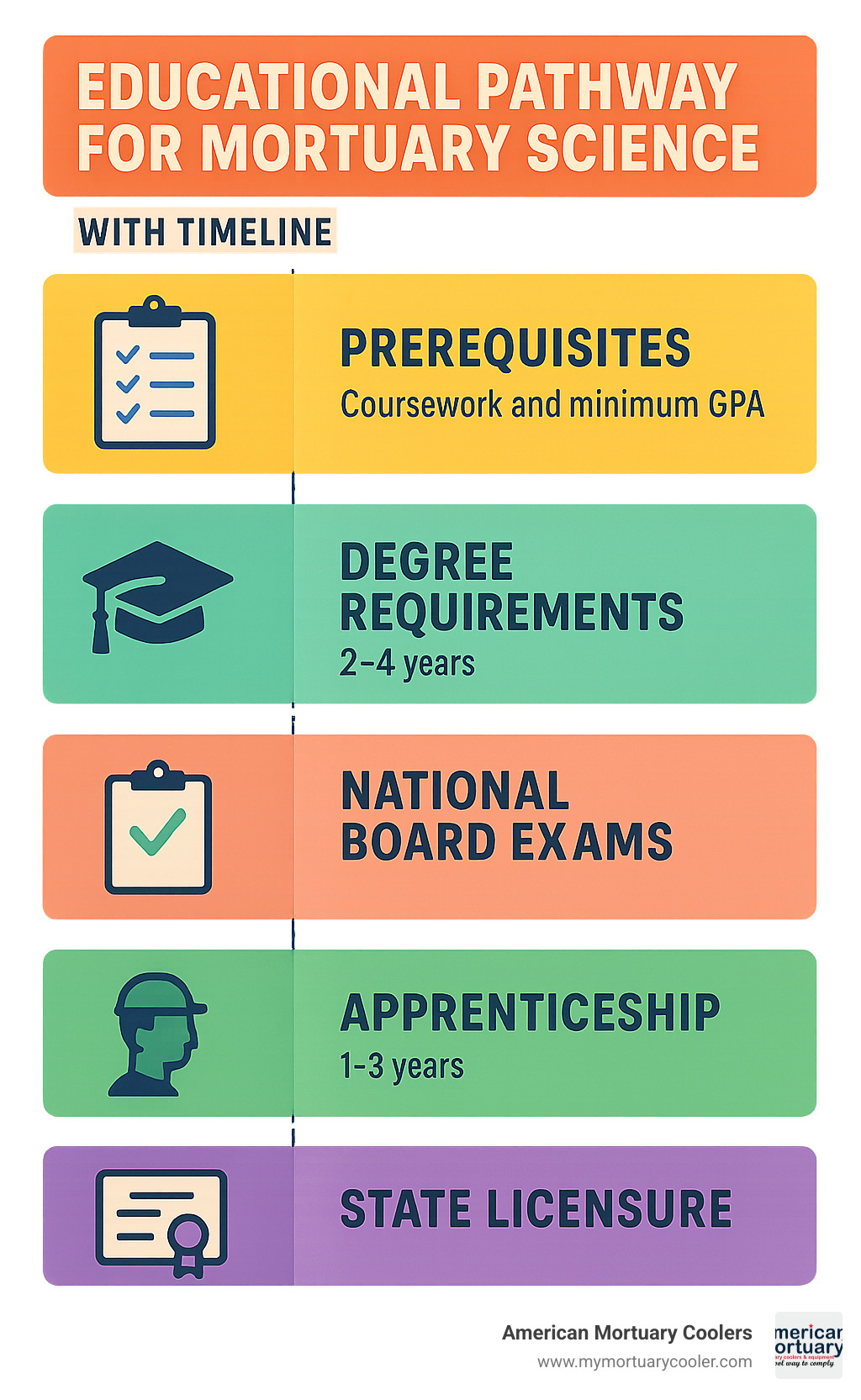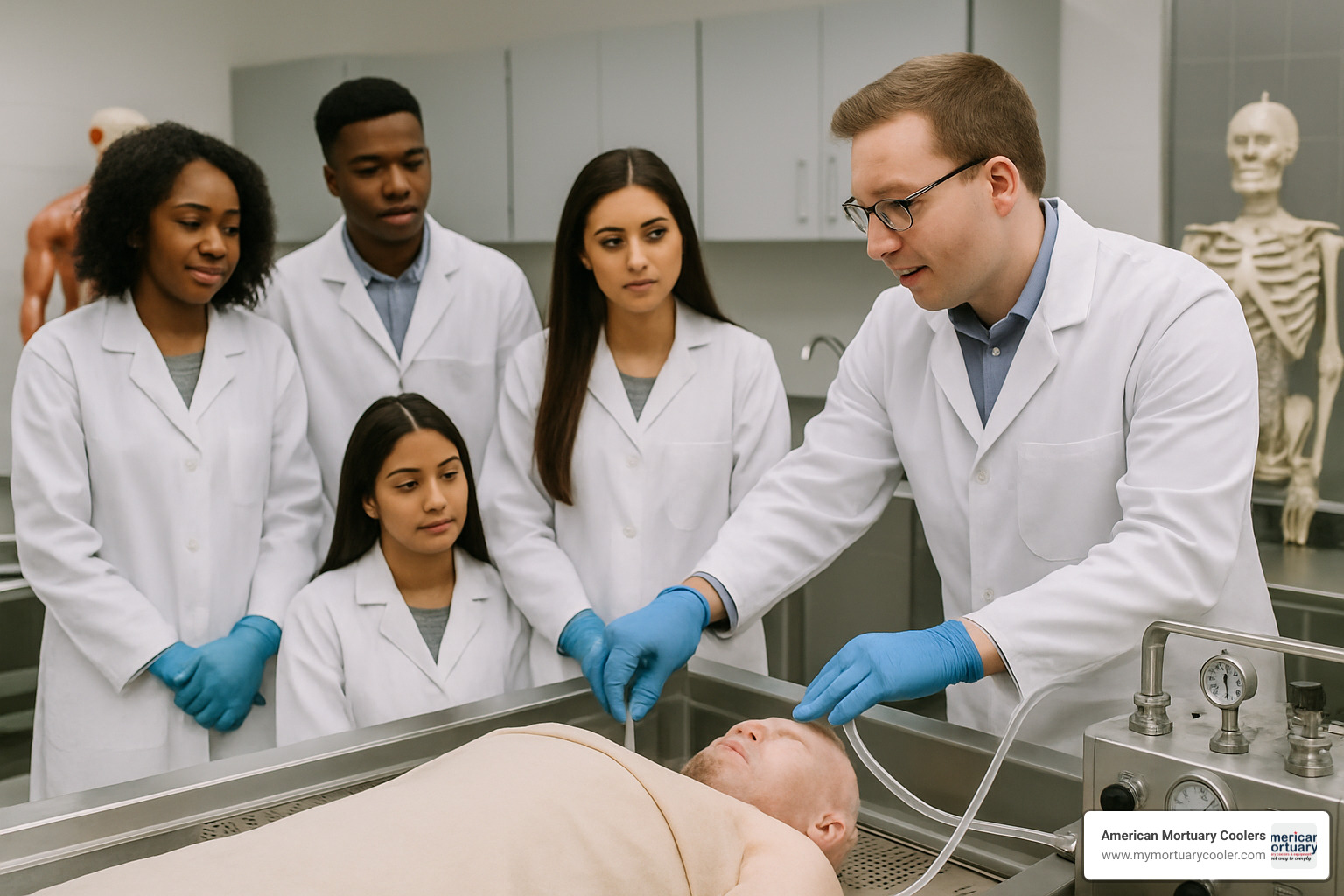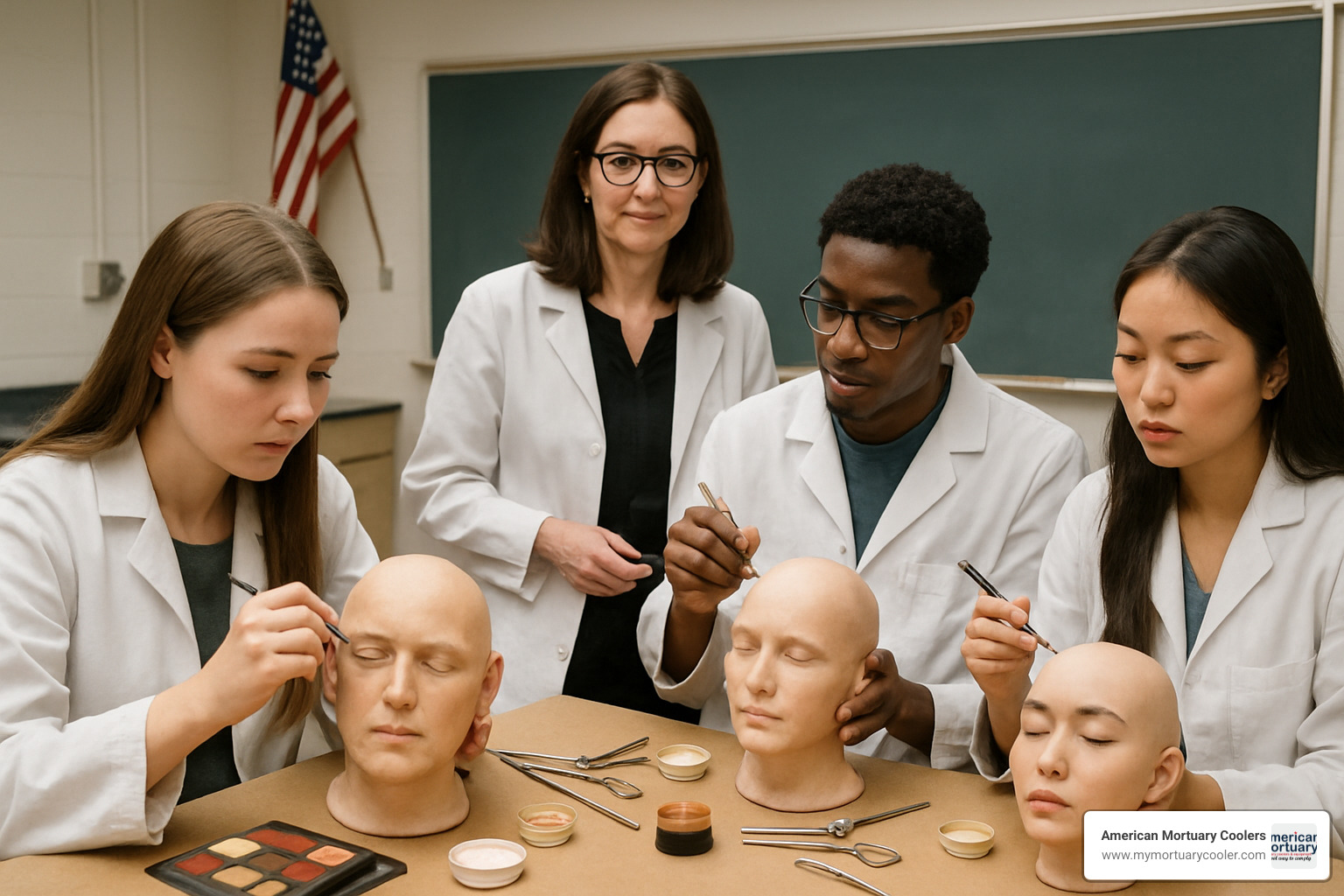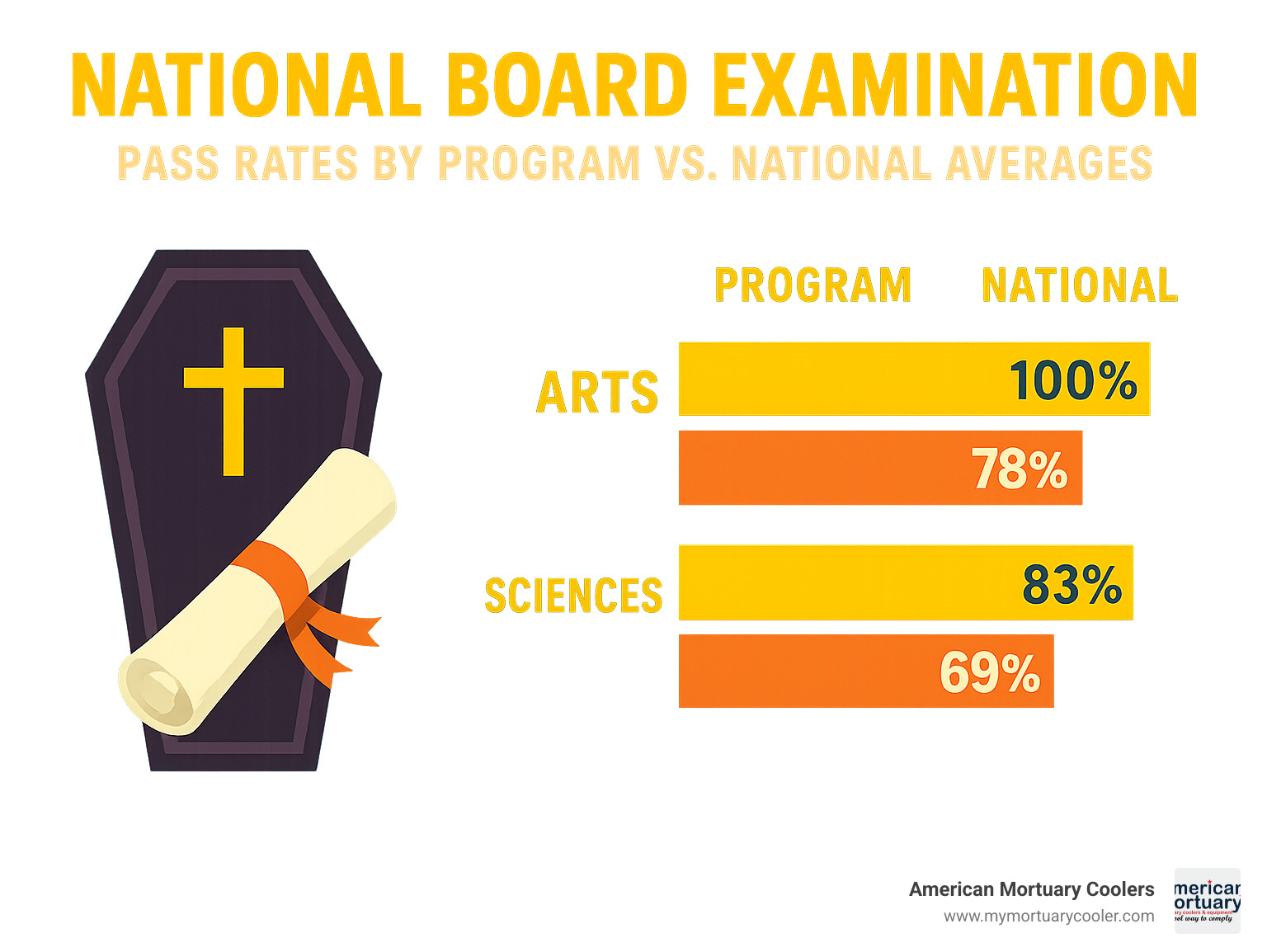Navigating Your Path to a Rewarding Funeral Service Career
A mortuary science degree is a specialized academic credential that prepares students for careers in funeral service, combining scientific, business, and interpersonal components. This education pathway typically takes 2-4 years to complete and serves as the foundation for licensure as a funeral director or embalmer.
| Mortuary Science Degree at a Glance | |
|---|---|
| Degree Types: | Associate (2 years) or Bachelor's (4 years) |
| Key Coursework: | Embalming, anatomy, restorative art, funeral directing, grief psychology, business management |
| Accreditation: | American Board of Funeral Service Education (ABFSE) |
| Career Paths: | Funeral Director, Embalmer, Restorative Artist, Funeral Home Manager |
| Median Salary: | $61,261 (Cook County, IL example) |
| Job Growth: | 9% projected growth (2021-2031) |
A mortuary science program combines scientific training with essential business and counseling skills. Students learn everything from the biology of deceased bodies to restorative arts, grief counseling, and funeral home operations. The coursework is designed to prepare compassionate professionals who can both care for the deceased and comfort the living during times of loss.
Most programs require completion of prerequisite courses with a minimum GPA (often 2.75 or higher) before admission to the professional sequence. The selective admission process reflects the specialized nature of this career path, which demands both technical proficiency and interpersonal sensitivity.
Upon graduation, students must pass the National Board Examination, complete a state-mandated apprenticeship (typically 1-3 years), and meet additional state-specific requirements to become licensed funeral service professionals.
I'm Mortuary Cooler, a national-level mortuary cooler supplier with extensive experience working alongside mortuary science graduates who rely on proper equipment for their daily operations involving the care and preparation of the deceased. My work with funeral homes across the country has given me unique insights into how mortuary science degree programs prepare professionals for the practical challenges of funeral service.

Mortuary science degree terms to remember:
Mortuary Science Degree 101: Definition & Overview

Ever wondered what exactly a mortuary science degree teaches you? Think of it as the foundation that bridges compassion with technical expertise in the funeral service profession.
At its heart, a mortuary science degree prepares you to honor the dead and comfort the living – two equally important missions in this meaningful career path. When a family experiences loss, graduates of these programs step in with both the scientific knowledge and the human touch needed during life's most difficult moments.
The beauty of mortuary science education lies in its diversity. One day you might be studying the intricacies of embalming techniques, and the next, you're learning how to guide families through their grief journey. This blend of science and humanity makes the field uniquely rewarding.
"I never expected to use so many different skills in one profession," shares a recent graduate. "From chemistry and anatomy to psychology and business management – my mortuary science degree prepared me for all of it."
The American Board of Funeral Service Education ensures all accredited programs deliver comprehensive training across multiple disciplines. Your coursework will cover scientific foundations like anatomy and microbiology, alongside practical skills in embalming and restorative art. You'll also develop professional abilities in funeral directing, business operations, mortuary law, and bereavement support.
Most students enter the field with plans to become practitioners – the funeral directors and embalmers working directly with families. Others have their sights set on eventually owning or managing funeral establishments. The wonderful thing about a mortuary science degree is that it builds the foundation for both paths, giving you flexibility as your career evolves.
The skills you'll develop extend far beyond the technical aspects of the profession. You'll master communication techniques for supporting families in crisis, develop ethical frameworks for difficult decisions, and build business acumen essential for the profession's administrative side. These transferable skills serve graduates well, whether they remain in funeral service or eventually pursue related fields.
At American Mortuary Coolers, we see how crucial proper education is for funeral professionals. The practitioners who use our custom-designed mortuary refrigeration systems have consistently shared how their educational foundation prepared them for the practical challenges of preserving dignity for the deceased while supporting families through their darkest hours.
As one seasoned funeral director put it, "My mortuary science degree didn't just teach me procedures – it taught me purpose." This powerful combination of technical knowledge and compassionate care is what makes mortuary science graduates so valuable to the communities they serve.
Degree Paths, Admission Requirements & Online Options
Choosing the right path to your mortuary science degree is a bit like planning a funeral service itself – it requires careful consideration of options, timing, and personal circumstances. Let's explore the educational journeys available to aspiring funeral professionals.
Associate Degree Programs
An associate degree serves as the foundation for most funeral service careers. These two-year programs pack a powerful punch, delivering essential skills without the extended time commitment of a bachelor's degree.
"I initially chose the associate route because I wanted to enter the profession quickly," shares Michael, a funeral director in Tennessee. "The program gave me everything I needed to start my career, and later I decided to continue for my bachelor's."
These programs typically require 60-75 credit hours and focus heavily on the hands-on, practical aspects of funeral service. Community colleges often offer more affordable tuition rates, making this an economical entry point to the profession.
At Ivy Tech Community College, the selective admission process uses a point system based on prerequisite grades. With only 30 students accepted per cohort, maintaining that minimum 2.75 GPA in prerequisites like English composition, biology, and mathematics becomes crucial for standing out among applicants.
Bachelor's Degree Programs
For those looking for a deeper dive into funeral service education, bachelor's programs offer comprehensive preparation with additional business and management training. These four-year programs (120-130 credit hours) often appeal to students with long-term aspirations of funeral home ownership or corporate advancement.
Southern Illinois University Carbondale boasts one of the nation's most selective bachelor's programs, with impressive statistics to back up their quality – a 92% graduation rate with 83% of graduates finding employment within two years. These numbers reflect the value employers place on this higher level of education.
Online and Hybrid Options
The digital revolution hasn't bypassed mortuary science. Today's students can pursue their education through innovative online and hybrid programs that accommodate diverse life circumstances.
Wayne State University stands out with their online Bachelor of Science in Mortuary Science, which meets licensure requirements in all 50 states. Perhaps the most appealing aspect is their equitable approach to tuition – online students pay in-state rates regardless of where they live, creating a financially accessible option for students nationwide.
The program thoughtfully addresses practical concerns too. Students complete hands-on experience at funeral homes in their local communities, eliminating the need to relocate for clinical training. This flexibility has opened doors for career-changers and working professionals who can't put their lives on hold for traditional education.
Pre-Mortuary Science Pathways
Not quite ready to commit fully? Pre-mortuary science tracks offer a gentle introduction to the field while completing general education requirements. North Central State College's Associate of Science with a Pre-Mortuary Science focus lets students explore their interest while building a foundation that transfers smoothly to four-year programs later.
| Degree Type | Duration | Credit Hours | Typical Requirements | Best Fit For |
|---|---|---|---|---|
| Associate | 2 years | 60-75 | High school diploma/GED, prerequisites with 2.75+ GPA | Quick entry to workforce, budget-conscious students |
| Bachelor's | 4 years | 120-130 | Same as associate, sometimes higher GPA | Future managers, those seeking advancement |
| Online/Hybrid | Varies | Same as traditional | Standard plus technology requirements | Working adults, parents, distant learners |
| Pre-Mortuary | 1-2 years | 30-60 | Standard college admission | Career explorers, transfer preparation |
The application timeline for most mortuary science degree programs follows a predictable pattern. You'll need to complete prerequisites with required grades, submit official transcripts, meet minimum GPA requirements, complete program-specific applications, and sometimes interview with faculty members.
As one program director advised me during a recent equipment installation, "We look beyond grades to find students with the right combination of compassion and resilience. This profession isn't for everyone, but for the right person, there's nothing more rewarding."
Remember what Ivy Tech wisely notes: "Job hunting should start early in the Mortuary Science program." Building professional connections while still in school often leads to apprenticeship opportunities and eventual employment.
For more detailed information about flexible learning options, check out Explore Affordable Online Funeral Director Programs.
Curriculum & Learning Outcomes in a Mortuary Science Degree

When you enroll in a mortuary science degree program, you're signing up for an educational journey unlike any other. The curriculum blends science, art, business, and compassion in a way few other degrees do. It's designed to transform students into professionals who can handle both the technical aspects of caring for the deceased and the emotional needs of grieving families.
Think of it as learning to be both a scientist and a counselor, with a bit of business manager and artist thrown in for good measure.
"I never expected to use so many different parts of my brain in one career," shares Maria, a recent graduate from Cincinnati College of Mortuary Science. "One hour I'm applying my knowledge of chemistry for embalming, the next I'm helping a family plan a meaningful service."
Core Curriculum Components
The scientific foundation of a mortuary science degree gives you the knowledge to understand what happens to the human body after death. You'll dive into anatomy and physiology, learning about the body's systems with special attention to vascular structures crucial for embalming. Microbiology teaches you about pathogens and sanitation principles – essential knowledge when handling deceased individuals who may have had infectious diseases.
Chemistry courses aren't just abstract formulas; they're directly applied to understanding preservation techniques and embalming solutions. And pathology helps you recognize how different diseases affect the body, which impacts how you'll prepare the deceased.
The technical side of your education includes both theory and hands-on practice. Embalming labs give you supervised experience in preservation techniques, while restorative art classes teach you to recreate natural features and expressions – skills that provide immeasurable comfort to grieving families seeing their loved one one last time.
"The first time I successfully restored someone's appearance after significant trauma, I understood why we call it an art," explains James, an embalmer in Tennessee. "The family's relief when they saw their father looking peaceful was worth every hour of practice."
Professional skills make up another significant portion of your mortuary science degree. Funeral directing courses teach you to coordinate services and ceremonies with sensitivity and attention to detail. Business management prepares you for the operational side of funeral service, from accounting to marketing. Mortuary law ensures you understand the legal requirements surrounding death certificates, disposition, and running a funeral business.
Perhaps most importantly, courses in grief psychology and thanatology (the study of death and dying) help you understand the emotional journey of those you'll serve. You'll learn to recognize different grieving styles and how to provide appropriate support without becoming emotionally overwhelmed yourself.
Learning Outcomes
The American Board of Funeral Service Education (ABFSE) requires all accredited mortuary science degree programs to develop specific competencies in their graduates. These learning outcomes reflect the comprehensive nature of funeral service work:
You'll learn to build meaningful relationships with the families and communities you serve, developing cultural competence to work with diverse populations. Ethical conduct becomes second nature as you practice applying professional standards to challenging situations, balancing business needs with compassionate care.
Legal knowledge is paramount – you'll become fluent in federal, state, and local laws governing funeral service, ensuring you maintain compliance with all regulations. Public health principles guide your handling and preparation of human remains, implementing universal precautions to protect yourself and others.
The technical skills you develop in embalming and restorative art enable you to prepare the deceased with dignity and care. You'll master the art of conducting arrangement conferences, visitations, and ceremonies that help families begin their healing journey. Your education covers all disposition methods – burial, cremation, and other options – ensuring you can guide families through their choices with confidence.
Perhaps most importantly, you'll develop the ability to address the grief-related needs of the bereaved, recognizing when someone might need additional support beyond what you can provide. Management skills prepare you for the business side of funeral service, while communication abilities ensure you can express complex information with clarity and compassion.
Core Skills You'll Master with a mortuary science degree
Beyond the formal curriculum, your mortuary science degree develops essential professional abilities that set you apart. Your communication skills will be honed through role-playing, practice arrangement conferences, and documentation exercises. You'll learn to explain complex concepts in simple terms and to listen with genuine empathy – perhaps the most valuable skill of all.
Ethical decision-making becomes second nature as you steer the complex situations that arise when family dynamics, financial considerations, and professional responsibilities intersect. Public health knowledge ensures you protect both yourself and the community through proper sanitation, disinfection, and preservation techniques.
Restorative techniques represent the unique blend of science and art that defines mortuary science. You'll develop the ability to restore natural appearance to the deceased, combining anatomical knowledge with artistic skill to create meaningful final viewing experiences for families.
"People often ask if it's difficult working with the deceased," notes Robert, a funeral director in Oregon. "I always tell them that the technical skills become routine. The real art is working with the living – helping them begin to heal through meaningful services and compassionate care."
Sample Semester Plan for a mortuary science degree
A typical associate degree program might follow this progression:
Your first two semesters focus on foundational knowledge – English composition, biology, psychology, mathematics, public speaking, anatomy, and ethics. These courses build the base for your professional studies and fulfill general education requirements.
By your third semester, you're diving into core mortuary science coursework. You'll take funeral service history and psychology alongside your first embalming theory and laboratory classes. Restorative art theory and lab give you hands-on practice, while funeral directing and mortuary law introduce you to professional practice standards.
Your fourth semester deepens your technical knowledge with advanced embalming theory and laboratory work, microbiology, pathology, funeral home management, and merchandising courses. By your final semester, you're taking comprehensive review courses to prepare for board exams, completing your funeral service practicum in a real-world setting, and studying specialized topics like cremation fundamentals and professional ethics.
This carefully structured progression ensures you build knowledge systematically, beginning with general concepts and advancing to specialized professional applications before culminating in practical experience.
For students considering a four-year program, bachelor's degrees offer additional depth in business management, advanced sciences, and liberal arts. You can learn more about these programs in our Ultimate Guide to a Mortuary Science Bachelor's Degree.
As you progress through your mortuary science degree, you'll transform from a curious student into a confident professional, ready to serve families during their most difficult moments with both technical expertise and genuine compassion. It's demanding work that requires a unique combination of head and heart – but for those called to this profession, there's nothing more rewarding.
Accreditation, Licensure Steps & National Board Exams

The journey from classroom to funeral home doesn't end with your mortuary science degree – it's just the beginning. The road to becoming a licensed funeral service professional involves several important milestones that ensure you're truly prepared to serve families during their most vulnerable moments.
ABFSE Accreditation
When choosing a mortuary science degree program, accreditation isn't just a nice-to-have – it's essential. The American Board of Funeral Service Education (ABFSE) serves as the watchdog for educational quality in our field, and they don't take this responsibility lightly.
"Our program underwent rigorous review to earn our accreditation," shared one program director I met while delivering mortuary coolers to their teaching lab. "The ABFSE examines everything from our curriculum to our facilities to ensure graduates are truly prepared for professional practice."
This accreditation matters for practical reasons too. Without it, you won't qualify for federal financial aid, you can't sit for licensing exams, and you'll face major problems if you ever want to transfer credits. Hudson Valley Community College puts it plainly: "Program completion qualifies graduates to sit for both national and state board examinations" – but only with proper accreditation.
Programs typically undergo review every 7-8 years, and the standards are comprehensive. Chandler-Gilbert Community College proudly notes their program was "Initially ABFSE accredited in 1997; reaccredited in October 2021 for seven years." That longevity speaks volumes about their commitment to quality education.
National Board Examination
After completing your mortuary science degree, you'll face what many graduates consider their biggest hurdle: the National Board Examination (NBE). Administered by the International Conference of Funeral Service Examining Boards (affectionately known as "The Conference"), this comprehensive exam evaluates your readiness for professional practice.
The exam is divided into two distinct sections:
The Arts Section tests your knowledge of the "people side" of funeral service – funeral directing, marketing, counseling, regulatory compliance, and cemetery/crematory operations. It's where your interpersonal and business skills shine.
The Sciences Section evaluates your technical knowledge – embalming techniques, restorative art, preparation procedures, and funeral service sciences. This is where all those hours in the embalming lab prove their worth.
Pass rates tell an interesting story about program quality. While delivering mortuary coolers to different programs, I've noticed the schools with the most up-to-date equipment often boast the highest pass rates. Hudson Valley Community College, for instance, reported impressive 2023 results: "Arts 100% vs national 78%; Sciences 83% vs national 69%." Other programs face more challenges, with rates below the national average.

State Licensure Requirements
While the NBE provides a national standard, funeral service licensing happens at the state level, creating a patchwork of requirements across the country. As I travel delivering mortuary coolers to funeral homes nationwide, I hear about these variations.
Most states share common requirements: an accredited mortuary science degree, passing NBE scores, a state-specific jurisprudence exam, and an apprenticeship period. This apprenticeship typically runs 1-3 years, depending on the state, and provides crucial hands-on experience.
"My education taught me the 'what' of funeral service, but my apprenticeship taught me the 'how,'" one funeral director told me while we installed their new cooler. "There's simply no substitute for learning alongside experienced professionals."
Wayne State University's online program highlights this reality, noting their degree "meets the educational requirements for licensure in every state," while acknowledging students must still fulfill those state-specific requirements beyond education.
How to Become a Licensed Funeral Director or Embalmer
The path to licensure follows a logical progression that builds your skills step by step:
Your education forms the foundation – completing prerequisites, earning your mortuary science degree with the required GPA (typically 2.5+), and absorbing both theoretical knowledge and practical skills.
Next comes examination – applying for the NBE through The Conference, scheduling your exam at a Pearson VUE testing center, and successfully passing both sections. Many states add their own jurisprudence exam focusing on state-specific regulations.
The apprenticeship phase bridges education and independent practice. You'll apply for an apprentice license, secure a position with a licensed establishment, complete required casework, and document everything carefully. This is where theory meets reality, often with humbling but valuable lessons.
The licensure application brings everything together – submitting your completed application with all required documentation, paying fees, completing any background checks, and possibly attending an interview with your state board.
Finally, continuing education ensures you grow throughout your career. As one veteran funeral director told me, "In 30 years, I've never stopped learning. This profession constantly evolves, and continuing education keeps me serving families with the latest approaches."
Ivy Tech Community College offers practical advice I've seen graduates follow with success: "Celebrate, notify your program chair, contact your state licensing board, download and submit internship application, and start your internship." Simple steps that launch a meaningful career.
For detailed information about licensure trends and requirements across different states, the Conference on Funeral Service Examining Boards provides regularly updated resources.
At American Mortuary Coolers, we've worked with countless newly licensed funeral directors setting up their first facilities. The pride they show when placing their framed license on the wall reminds us of the significance of this journey – and why maintaining high standards through accreditation and licensure matters so much to the families we all serve.
Careers, Salary & Job Outlook

Earning your mortuary science degree doesn't just provide education—it open ups a world of meaningful career opportunities where you can make a difference in people's lives during their most vulnerable moments. The funeral service industry offers diverse paths that blend compassion with practical skills, creating rewarding lifelong careers.
Career Paths
When you graduate with your mortuary science degree, you'll find several career directions waiting for you. Many start as funeral directors, the professionals who guide families through the entire arrangement process. As Cypress College's Mortuary Science Department beautifully puts it, these professionals "work with the loved ones of those deceased to arrange funerals and prepare bodies after death." Funeral directors handle everything from the initial family meeting to coordinating with clergy, filing legal documents, and ensuring the service runs smoothly.
Others gravitate toward becoming an embalmer, focusing on the technical and artistic side of funeral service. These specialists preserve and prepare the deceased, perform restorative procedures when needed, and apply cosmetics to create a natural, peaceful appearance for final viewings. In larger funeral operations, we're seeing more professionals specializing exclusively in embalming at centralized preparation facilities.
With cremation rates climbing nationwide, cremation specialists are increasingly in demand. These professionals operate cremation equipment, maintain strict identification procedures, process remains, and help educate families about their options in this growing area of funeral service.
Many graduates with leadership skills become funeral home managers, overseeing staff schedules, facility maintenance, financial operations, and regulatory compliance. It's a role that perfectly balances the people-focused and business aspects of funeral service.
For those with entrepreneurial dreams, becoming a funeral home owner remains an achievable goal. Despite industry consolidation, a remarkable 86% of U.S. funeral homes remain privately owned—many passing from one generation to the next within families. If you have the vision and business acumen, ownership offers the freedom to shape funeral service in your community according to your values.
Salary & Job Outlook
The financial picture for mortuary science degree graduates is reassuringly stable. In Cook County, Illinois, for example, funeral directors earn a median annual wage of $61,261, with experienced professionals taking home up to $142,737. Embalmers in the same area earn a median of $55,330, potentially reaching $96,747 with experience, while funeral home managers typically earn around $57,831.
The future looks bright too. The Bureau of Labor Statistics projects a healthy 9% job growth for funeral service workers between 2021 and 2031—faster than the average for all occupations. This growth translates to about 7,900 new positions annually across the country.
Several factors drive this positive outlook. America's aging population means an increasing number of deaths in coming decades. At the same time, many current funeral directors are approaching retirement age themselves. North Central State College notes that "nearly half of Ohio's funeral directors are over the age of 55," a pattern repeated across many states. This coming wave of retirements creates excellent opportunities for new professionals entering the field.
The employment statistics from mortuary science programs tell an encouraging story. Chandler-Gilbert Community College reported that 100% of their 2022 graduates found employment, with 95% working specifically in funeral service. Similarly, Hudson Valley Community College saw 92% of their graduates employed, with 67% in funeral service positions.
Personal Qualities for Success
While your mortuary science degree provides essential knowledge and skills, certain personal qualities significantly influence your success and satisfaction in this unique field.
Compassion forms the foundation of funeral service. The ability to genuinely empathize with grieving families creates meaningful connections during their most difficult times. As one experienced funeral director shared, "Technical skills can be taught, but compassion comes from within. It's what families remember long after the funeral is over."
Resilience helps you maintain your emotional health while supporting others through grief. Developing healthy boundaries and self-care practices is essential when working daily with loss and emotional intensity.
Attention to detail distinguishes exceptional funeral service professionals. From ensuring legal documents are completed correctly to noticing when a flower arrangement needs adjusting before a service, the small things make a significant difference to families.
Business acumen becomes increasingly important as your career advances, especially if you aspire to management or ownership. Understanding financial management, marketing, and strategic planning complements your caregiving skills.
As Chandler-Gilbert Community College perfectly summarizes, success in this field "requires a unique combination of interpersonal skills, intellect, and business acumen."
Internship & Networking Opportunities
Your journey into funeral service begins before graduation through clinical placements and internships that provide hands-on experience in real funeral home settings. These valuable opportunities typically include observing embalming procedures, participating in arrangement conferences, assisting with services, learning administrative tasks, and building professional relationships.
Many programs, like Wayne State University's online offering, allow students to "complete practical experience at a funeral home near their home," making practical training accessible regardless of where you live.
Professional connections will support your growth throughout your career. Joining associations like the National Funeral Directors Association (NFDA), National Funeral Directors & Morticians Association (NFDMA), or Cremation Association of North America (CANA) connects you with mentors, continuing education, and job opportunities.
One successful funeral director offers this advice: "Join professional associations as a student member. The connections you make and the mentorship you receive can be just as valuable as your formal education."
At American Mortuary Coolers, we've had the privilege of working with countless mortuary science degree graduates as they establish and advance their careers. We've seen how the right education combined with practical experience and quality equipment creates funeral service professionals who make a meaningful difference in their communities.
For more detailed guidance on building your funeral service career, visit Your Path to Becoming a Funeral Director.
Conclusion
A mortuary science degree provides a comprehensive foundation for a rewarding career in funeral service. This specialized education blends scientific knowledge, technical skills, business acumen, and interpersonal sensitivity to prepare graduates who can confidently care for the deceased while supporting families during their most vulnerable moments.
The path to becoming a licensed funeral service professional isn't always easy. It requires genuine dedication—from completing rigorous coursework at an accredited program to passing national board examinations and fulfilling state-mandated apprenticeship requirements. But ask any funeral director, and they'll likely tell you the same thing: the opportunity to provide meaningful support to families during their darkest hours makes every challenge worthwhile.
As consumer preferences evolve and demographic shifts continue, mortuary science degree programs are adapting in real-time. Today's curriculum reflects both timeless traditions and emerging trends, ensuring graduates enter the profession fully prepared for its realities. With the Bureau of Labor Statistics projecting 9% job growth between 2021 and 2031, the future looks promising for those drawn to this essential calling.
At American Mortuary Coolers, we've had the privilege of working alongside funeral service professionals nationwide. From our home base in Johnson City, TN, our team delivers custom mortuary coolers and specialized equipment directly to funeral homes across all 48 contiguous states. This close relationship with funeral service practitioners has given us insight into how quality education translates into exceptional care.
We've seen how well-trained mortuary science graduates approach their work with both technical precision and genuine compassion. Whether carefully preparing the deceased for a final viewing or gently guiding a family through funeral arrangements, these professionals demonstrate the perfect balance of head and heart that defines excellence in funeral service.
If you're considering a mortuary science degree or already progressing through your education, you're preparing for more than just a career—you're embracing a vocation that makes a profound difference during life's most challenging transitions. Few professions offer the same opportunity to provide such meaningful service to communities.
For those interested in learning more about the equipment that supports the daily work of funeral service professionals, visit Your One-Stop Shop for Mortuary Coolers.


















